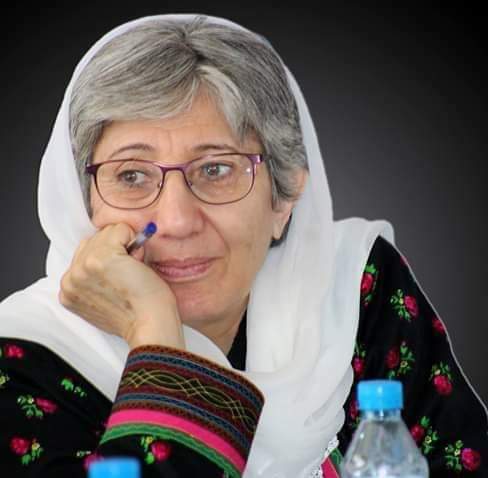18.05.2021, Interview with Sima Samar, Afghan human rights defender: “Men make war, so they think they are the ones to make peace”
The peace negotiations between the Taliban and the Afghan government have been ongoing since September 2020, with only four women on the 21-member government negotiation team and none among the Taliban negotiators. We ask Sima Samar, founder of the Afghanistan Independent Human Rights Commission and of Gawharshad University in Kabul, what the chances are for lasting peace.

PWAG: Four journalists, a doctor, a policewoman and two Supreme Court judges are among the women who have been assassinated or who were targets of assassination attempts. Why have attacks on women increased since the peace negotiations began?
Sima Samar: It is very unfortunate that the violence increased after the intra-Afghan talks started in Doha. Many more women have been killed than the ones mentioned. I believe that the Taliban use violence to terrorise the people so they blame the government for not protecting them. The Taliban use violence to gain more power. They want to be in charge of the government and the people.
Women are underrepresented in these negotiations. Why?
Women are always underrepresented; it is not new. The Taliban do not recognise the existence of women. They have previously revealed their attitude towards women's rights. But thanks to the advocacy of women’s groups, human rights defenders and civil society, the Afghan government put four women on the negotiation team. Not enough, but better than none. We live in a patriarchal world. Men make the weapons and make war, so they think that they are the ones to make peace as well.
Why is it significant that the government has included women in its negotiation team?
The Afghan government has a constitutional obligation in addition to its obligation to human rights conventions. But when they convene consultation meetings on any government program or on peace, they very rarely include a woman.
How meaningful is the participation of the four women involved in the peace negotiations?
They are committed and powerful women, but they are only four Afghan women along with 42 men at the table. They need the support not only from Afghans but from the international community as well.
According to Human Rights Watch, there is a gap between official Taliban statements on rights and women and the positions their officials adopt in regions controlled by the Taliban, where girls are still barred from going to school. How is it possible to negotiate a lasting peace under such circumstances?
We cannot believe what the Taliban say, they have to demonstrate with their actions that they have changed. If they are serious about making peace, they cannot violate the human rights of half of the population. They cannot make peace with only 50% of the population.
What have the peace negotiations achieved so far?
The process is very slow. So far, they only have agreed on the procedure of the peace talks and the two negotiation teams. Not much has been achieved – at least, we do not know what has been achieved.
What role do women’s organisations and activists play in the peace process?
Women’s groups and civil society organisations are lobbying for an inclusive peace process with the government and the international community – and for the voices of the women who were directly affected by the war to be heard. But politicians do not prioritise the provision of justice. A lasting peace will be guaranteed if women can meaningfully participate in the process and the human rights of all people are safeguarded. Otherwise, it will be a short-term political and power-sharing deal, not sustainable peace. That is why any peace process requires a strong political will. It must be people- and justice-centred to be successful. Afghanistan’s recent history has made this clear.
How can a course like the one at Gawharshad University on “Gender and Peace” contribute to peacebuilding?
This kind of course gives the youth a deeper understanding of gender and peace and helps them understand the importance of gender in peace.
What effect does a failed peace in Afghanistan have on women elsewhere?
I believe that if women in Afghanistan are not free it will affect everyone. We see similar activities of fundamentalist groups everywhere, not only among the Muslims, but in countries with different religions as well. Women’s groups around the world should be aware of the losses that we face and the dangers of repeating the past.
The US and NATO will withdraw their troops by 11 September. What do you think will be the consequences for the peace process?
I had hoped that the US would place conditions on their full withdrawal from Afghanistan. I regret that their statement didn’t mention human rights, women and girls. I understand the US public’s demand for a troop withdrawal, but it should have happened after a peace deal. This puts the Taliban in a winning position. Now they refuse to participate in the peace negotiations until the troop withdrawal is complete. I still hope that the US will push for a people- and victim-centred peace process and for a monitoring mechanism to hold violators of the peace deal accountable. Otherwise, we will have the same situation as in the 1990s. We should learn history’s lessons.
What can we expect in the coming months?
I do not want to be pessimistic. I hope that the people of Afghanistan can come together and form a united front for peace. The international community is learning from its mistakes and stands with the Afghan people. It supports peace with justice, where every citizen of Afghanistan enjoys basic rights and lives with dignity. Afghanistan will be a good example of peacebuilding; this is not impossible. It is difficult but it can be done with a united approach.
This interview was conducted between 9-20 April 2021.
Earlier and later events
Previous post: